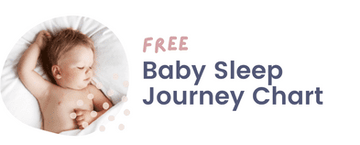
For babies, sleep is like a nutrient!
Sleep is a nutrient for your baby, just like milk is. When a baby sleeps is when they grow, when their learning consolidates, when their body repairs and strengthens their immune systems, when their brains create and connect new neurons, when their emotions are regulated.
Milk and food sustains a baby's physical development. Sleep sustains their physical, mental, emotional and social development. Simple as that.
Sleep needs to be held in the same esteem as food. We cannot simply skip naps or miss our baby's normal bedtime. After all, you would never dream of skipping a feed or giving your baby less milk than they need?!
In this article:
- Why we shouldn't accept poor sleep as "normal"
- How overtiredness affects your baby
- The relationship between feeding and sleep
- How you can improve your baby's sleep
Struggling with overnight wakes?
We can help you get more sleep! With the customised sleep schedules, gentle settling methods and personalised support available in our Little Ones App, you and your little one will soon be sleeping soundly.
Choose your Sleep Solution
Poor sleep shouldn’t be "normal" for a baby
I'm talking, to an extent, about the general acceptance that poor sleep is "normal" for a baby, that you shouldn't seek to improve your baby's sleep situation if you've got a bad sleeper, that chronic sleep deprivation is okay for both baby and mother.
Poor feeding is quick to be addressed and improved upon; if a baby isn't feeding well and is losing weight it becomes a medical concern and appropriate intervention steps are taken. This needs to happen with sleep too!
When your baby has decent naps a whole raft of incredible things happens - your baby's growth hormones are released, their energy is restored and stress reduced, memory is repaired, new brain connections are created, their immune system is strengthened and their appetite is regulated.
Sleep is a nutrient.
How overtiredness affects your baby
When a baby naps poorly or has a broken night sleep because they were over or under tired or they are too reliant on a parent-led sleep association, they will be in a constant state of overtiredness. This raises cortisol (stress) levels in their bodies, which inhibits their ability to concentrate, hinders social functioning and, of course, causes extremely unsettled behaviour.
Cortisol also has a similar effect to adrenaline or caffeine. This is why older babies and toddlers who are overtired can suddenly seem so WIDE awake - it's like they've just had a shot of coffee right before bedtime. It also inhibits the production and release of another hormone, melatonin, which is the one we actually need in order to settle well and stay asleep.
This means that the more overtired your baby is, the less likely they are to then settle easily at naps and bedtime. If they're overtired at bedtime, they're also starting off the night on the back foot and you're pretty much guaranteed a have a bad night of restless sleep and possibly an early wake the next morning too.
If your baby is sleeping poorly, it is possible to break this cycle of chronic overtiredness and get things back on track. Achieving good sleep actually isn't that hard or complicated, it's just misunderstood and poorly prioritised.
Sleep is a nutrient.
Feeding and sleep go hand in hand
Not only is good sleep important for its own benefits; it is also part of a healthy cycle for your baby that incorporates a baby's other main nutrient: feeding.
If a baby is sleeping poorly they can also be feeding poorly. This can be due to your baby being too tired to take a decent feed, relying on feeding to go to sleep therefore not taking a big enough feed because they fall asleep, snack feeding all day or general lack of appetite associated with lethargy and fatigue.
Likewise, if a baby is feeding poorly, they will usually be sleeping poorly too. For example, being hard to settle to sleep, waking early from naps or waking more frequently overnight due to hunger. Or, if there is an underlying cause for their feeding difficulties, like reflux or tongue tie, they can wake more frequently due to discomfort.
Say goodbye to sleepless nights.
Join over 800,000 families worldwide who are enjoying excellent sleep with our Sleep Programs, created by experts in the field of pediatric sleep.
Choose your Sleep Solution
One of our customers, Emily, recently said:
"Our baby is happier and healthier than he has ever been before! He was always a smaller baby but now, thanks to sleeping much better, has put on lots of weight and has a lot of energy to explore and play during the day! We no longer have bouts of screaming and whinging for no reason."
Sleep must be provided for babies in the same way milk/food is. Sleep is something our babies fundamentally need in order to thrive.
Sleep is a nutrient.
But, I hear you say, exactly how are we supposed to improve our baby's sleep?! Well, let's take a look...
How can you improve your baby's sleep?
First of all, giving sleep the respect it deserves and accepting that you can make some changes to your baby's sleep is the biggest step forward.
From there, it might be as simple as tweaking your baby's awake hours, adding or taking some things away from their sleep environment, changing their nap structure around a little bit or guiding them towards falling asleep independently in their own cot. Our Little Ones App contains all of the information and tools you need to achieve better sleep, along with support available from certified sleep consultants.
Sometimes, great sleep does come at a price and the cost is usually a short-lived sacrifice of time in order to prioritise and work on a baby's sleep. Some people might balk at that, but I look at it rationally - it is only temporary and in return you will gain a baby who naps well, sleeps well at night, is happy while awake, and, most importantly, is getting the good quality sleep they need.
It's a price I gladly pay. After all, sleep is a nutrient.
__________
Bibliography
Golem, D. L., Martin-Biggers, J. T., Koenings, M. M., Davis, K. F., & Byrd-Bredbenner, C. (2014). An integrative review of sleep for nutrition professionals. Advances in nutrition (Bethesda, Md.), 5(6), 742–759. https://doi.org/10.3945/an.114.006809
Karraker, K. H., & Young, M. (2007). Night Waking in 6-Month-Old Infants and Maternal Depressive Symptoms. Journal of applied developmental psychology, 28(5-6), 493–498. https://doi.org/10.1016/j.appdev.2007.06.002
Scher, A., Hall, W. A., Zaidman-Zait, A., & Weinberg, J. (2010). Sleep quality, cortisol levels, and behavioral regulation in toddlers. Developmental psychobiology, 52(1), 44–53. https://doi.org/10.1002/dev.20410
___________

Receive product and services updates, promotional offers and other marketing communications based.





